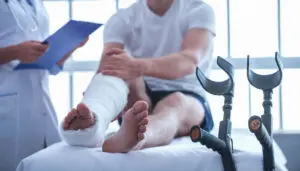What is a Claim?
A claim is a legal action concerning physical or mental harm suffered by the plaintiff due to the defendant’s negligence. In the case of insurance claims, it is a request made by the insured to the insurance company for coverage and compensation for damage or injury. A claim is sometimes also referred to as a Cause of Action.

What is a Claim?
Cornell Law School’s Legal Information Institute defines a claim as, “a set of operative facts creating a right enforceable in court.” Making a claim is how the process of a plaintiff filing a lawsuit and eventually receiving damages from a defendant begins. A claim must be present in order for a lawsuit to go forward. If one is not present in a specific instance, then that lawsuit will be dismissed. Examples of types of claims include claims to insurance companies, personal injury claims in cases of negligence, claims on breaches of contract, property claims, and employment claims such as unpaid wages, wrongful termination, or discrimination. A defendant may make a counterclaim against the claim of a plaintiff.
Claims can sometimes be dismissed even if there is an intent to file a lawsuit. Rulings in cases such as Ashcroft v. IQBAL and Bell Atlantic v. Twombly have determined that claims need to contain important information. They must be plausible on their own and establish a likelihood of liability. This is how claims can lead to fair compensation, resolution of disputes, and protection of rights.
More information about Claim
Can I Change Jobs While on Workers’ Compensation in Pennsylvania?
If you’ve been injured at work and receive workers’ compensation benefits in Pennsylvania, you might consider changing jobs for various reasons. Perhaps you’re seeking better opportunities, need to relocate, or want a position accommodating your medical restrictions. However, changing jobs while on workers’ compensation requires careful consideration to protect your benefits.
Avoid losing workers’ compensation benefits by making employment changes without legal guidance. The experienced Pennsylvania workers’ compensation attorneys at Munley Law have protected injured workers’ rights for over 65 years. Call us today for a free consultation to discuss your specific situation.
How Changing Jobs Affects Your Workers’ Compensation Benefits
When considering a new job while receiving workers’ compensation in Pennsylvania, understanding how this transition affects your benefits is essential. Changing employers doesn’t automatically terminate your workers’ compensation claim, but it can impact various aspects of your benefits. Here’s what you need to know about how changing jobs affects your medical coverage and wage loss benefits:
- Medical Benefits Will Continue: Your right to medical treatment comes from when your work injury occurred. […]
More information about Claim
Workers’ Compensation and Dealing with Doctors
After a workplace injury, dealing with doctors and medical examinations can significantly impact your workers’ compensation claim. Insurance companies often prioritize their interests over yours, making it essential to have proper legal representation to protect your rights.
Don’t let insurance companies undervalue your workplace injury claim. The experienced Pennsylvania work comp attorneys at Munley Law have been fighting for injured workers’ rights since 1959. Call us today for a free consultation and learn how we can help you receive the full compensation and medical care you deserve.
Understanding Insurance Company Doctors and IMEs
When you file a workers’ compensation claim, the insurance company will require you to undergo an Independent Medical Exam (IME). While these doctors are presented as neutral third parties who assess your injuries, they are selected and paid by the insurance company.
These company-approved physicians may not prioritize your recovery or fairly evaluate your condition. […]
Read MoreMore information about Claim
Bloomsburg Workers’ Compensation Lawyer
Munley Law’s experienced Bloomsburg workers’ compensation lawyers are committed to serving the hardworking individuals of Bloomsburg, Pennsylvania, and ensuring they receive the compensation they deserve. We understand the challenges injured workers face when navigating the complex legal landscape of workers’ compensation law. Our team is here to guide you through the process, providing expert advice and representation to protect your rights and secure the benefits you are entitled to.
Munley Law provides comprehensive representation, whether you’re dealing with a denied claim, workplace injuries, or issues with your employer or the insurance company. Our commitment to Bloomsburg workers goes beyond legal expertise – we genuinely care about your well-being and financial security. Trust us to be your advocates in pursuing the compensation you need to recover from your injuries and return to work.
Munley Law is dedicated to helping injured workers seek justice and fair compensation. Contact our Bloomsburg personal injury lawyers today for expert legal representation in workers’ […]
Read MoreMore information about Claim
Jim Thorpe Personal Injury Lawyer
After suffering an injury in Jim Thorpe, Pennsylvania, the situation can feel overwhelming—mounting medical bills, lost income, and the challenging physical recovery process can quickly become all-consuming. For over 65 years, Munley Law has been protecting the rights of injured victims throughout Pennsylvania. Our Jim Thorpe personal injury attorneys provide compassionate, expert legal representation so you can focus solely on healing. We handle every aspect of your case—from thorough case evaluation and insurance negotiations to calculating fair compensation and representing your interests in court if necessary. Don’t let personal injury law add to your burden. With Munley Law by your side, you can rest assured your rights remain protected while you prioritize what matters most: your recovery.
Types of Personal Injury Cases in Jim Thorpe We Handle
 Personal injury cases come in many forms. Here are some of the most common types that our personal injury lawyers serving Jim Thorpe might handle:
Personal injury cases come in many forms. Here are some of the most common types that our personal injury lawyers serving Jim Thorpe might handle:
Car accidents
Car accidents are among the most common causes of personal injury claims. […]
Read MoreMore information about Claim
What to Do If You Are Injured While on Vacation
A cruise in the Caribbean, a hiking trip in the Grand Canyon, a beach vacation in Hawaii, or exploring local gems — these are all dream vacations. But, even on a dream vacation, accidents can happen. One unexpected injury on vacation can throw you into a whirlwind of physical pain, emotional distress, and crippling financial debt.
If you were injured on vacation, don’t let worry consume you. The Munley Law personal injury lawyers can help you get back on your feet. We’re going to guide you through the right steps immediately following an injury and explain your legal rights after an accident. For more information, call an experienced lawyer at Munley Law today. We offer a free consultation where we listen to your story, explain your options, and help you understand the best path forward.
Immediate Steps to Take After a Vacation Injury
The first thing we need to discuss are actionable steps you can take immediately following an accident. […]
Read More








